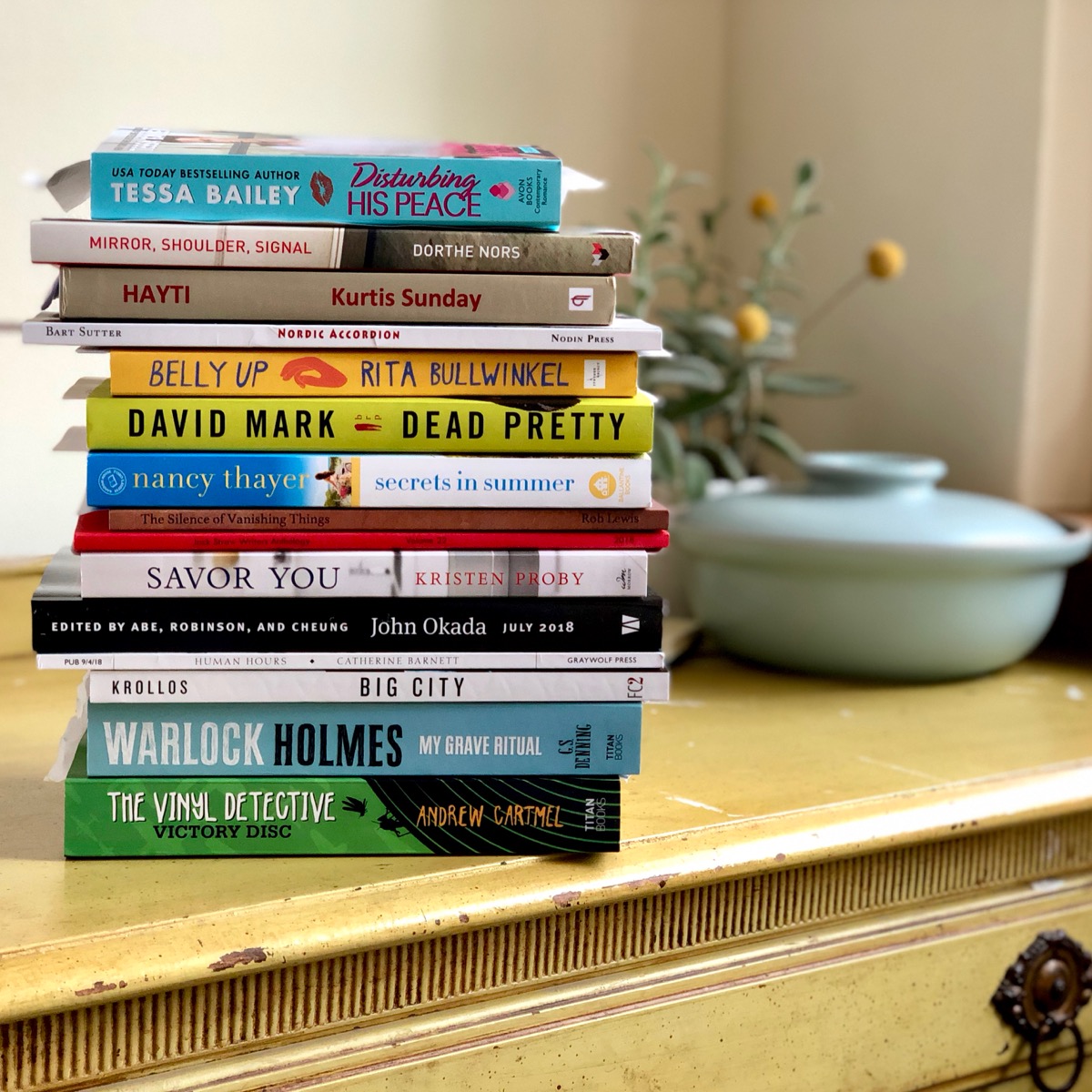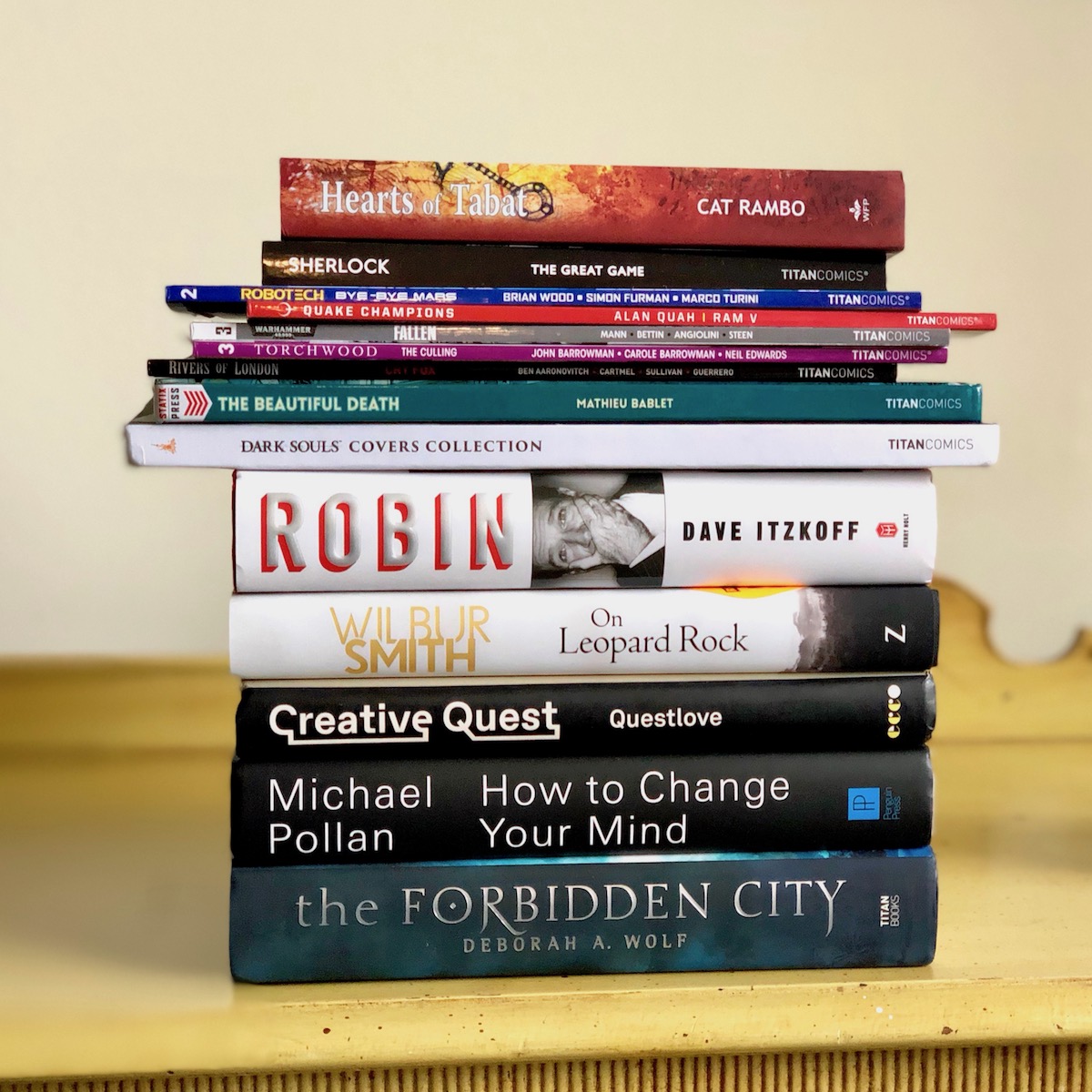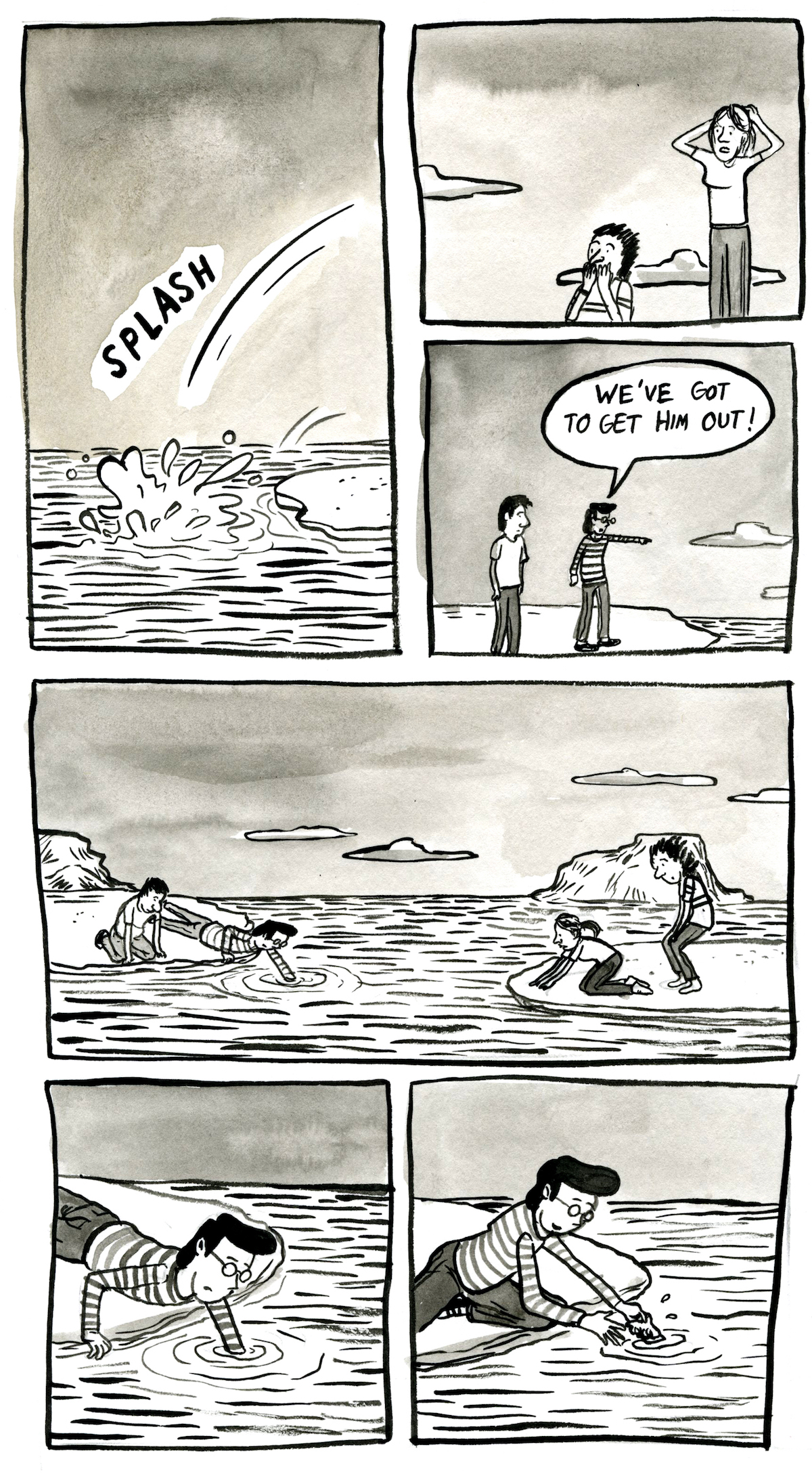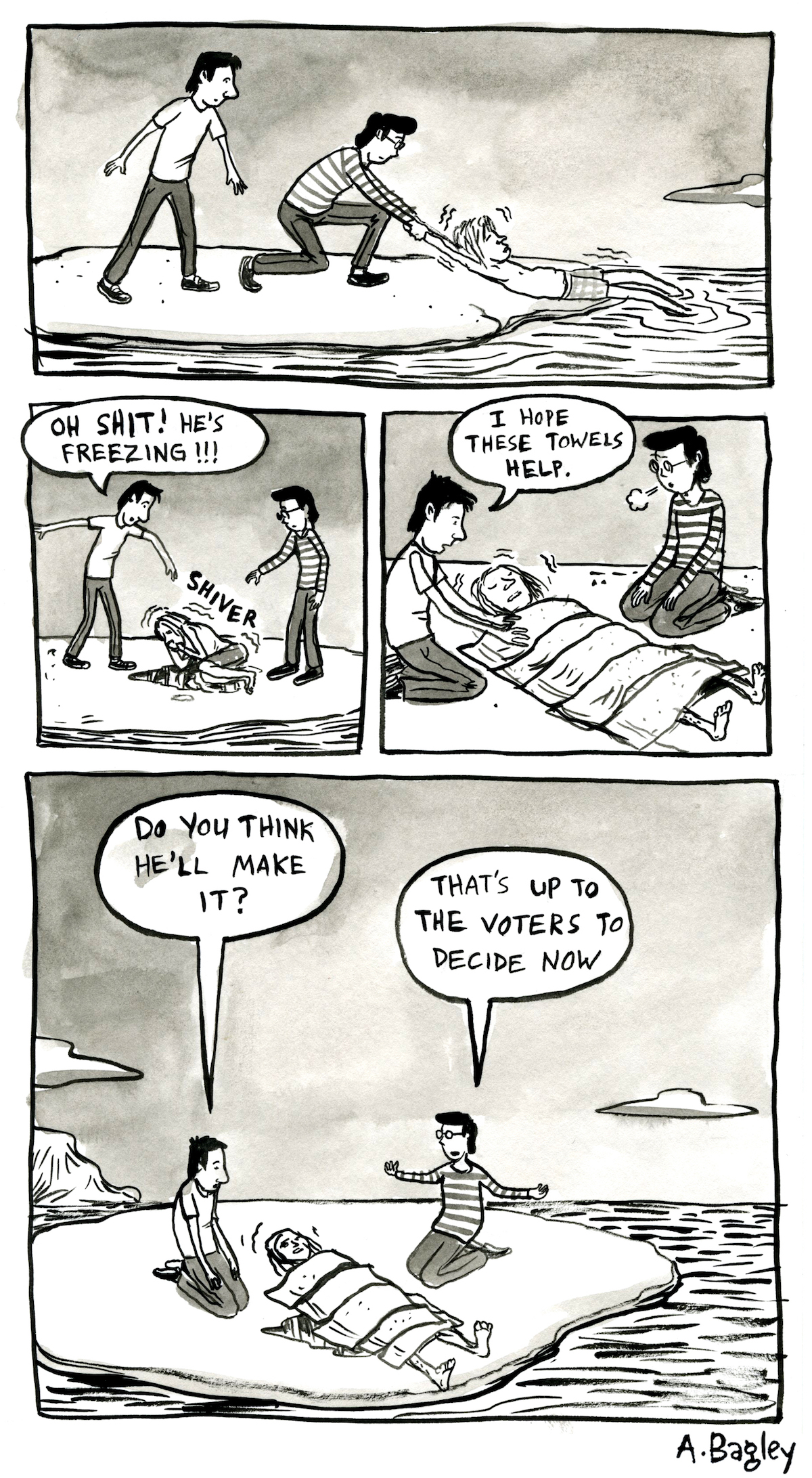Thursday Comics Hangover: Some recommendations for Free Comic Book Day
This Saturday is Free Comic Book Day, and you should absolutely pick up some free comics. But as I say every year, if you regularly shop for comics at comics shops, Free Comic Book Day isn't free. These comics may be free for customers, but theystill cost money for comics shop owners to buy, so it is your responsibility as a comics reader to help the comics shop absorb the expenses of the free comics by buying a few comics of your own. I like to use the day to pick up some trade paperbacks I've failed to pick up over the course of the year, for instance.
Don't know which books to buy? Allow me to help! Here are some of my favorite recent paperbacks:
- From local publisher Fantagraphics, I really dug the horror anthology Flayed Corpse, written by Josh Simmons and drawn by a host of other artists — many of whom live here in Seattle. And speaking of Seattle cartoonists, Ellen Forney's brand-new book Rock Steady is a heartfelt guide to staying calm and centered in moments of emotional crisis. (Forney will be reading and signing at the Fantagraphics Bookstore and Gallery on FCBD, so you can get an autographed copy for no extra charge.)

If you're looking for something for younger readers, I wrote about two exceptional new young adult releases from First Second just last week.
I can't stop thinking about Anneli Furmark’s comic Red Winter, which is about trying to find common ground in a nation torn apart by politics. I think when all is said and done, this could be one of my favorite books of the year.
Can't afford a trade paperback? Here are a few monthly issues that have been especially interesting lately: the first chapter of the utopian Old Woman Laura story in All-New Wolverine is a great kickoff to a promising new storyline that de-grims an awful (and awfully popular) Wolverine story; the Clowes-ian Miami noir of Dry County; and the first couple issues of the engaging historical Harlem-set mystery Incognegro: Renaissance.
In the mood for work from local cartoonists? Look for Katie Wheeler's personal diary comics; The City, which chronicles a fictional European city in between world wars; and Brett Hamill's very funny gag strips.
And lastly, if you liked the trippy cosmic energy of the Infinity War movie, you should definitely check out the reprints of Phillipe Druillet's Loan Sloane comics series, especially the latest installment, Gail. The goings-on in that book make Infinity War look like a comic book convention in comparison.
Crossing lines on paper

It took the Reading Through It Book Club over a year to find a book on immigration that felt relevant to our current political situation. Finally, we all agreed on Francisco Cantú's brand-new memoir The Line Becomes a River: Dispatches from the Border.
Donna Miscolta is correct in her review for the Seattle Review of Books: Line is a beautiful, complex book. In fact, it's so beautifully written that I had trouble reading it critically for the purposes of the book club. Far too often, Cantú's prose mesmerized me, leaving me unprepared to discuss the immigration policies that are at the forefront of American consciousness right now.
Cantú's account of life on the Border Patrol is complicated, empathetic, and introspective. He sees horrors out there in the desert, and he is forced, repeatedly, to confront his own moral boundaries in uncomfortable ways.
Members of the book club pointed out last night that Line is not just a book about immigration. It's also a top-tier book of nature writing, and a book packed with observations about culture. Cantú understands that borders aren't just lines on maps: they exist in nature, and they shape our society. You're not just writing about international relations when you're writing about the border with Mexico; you're also writing about the harsh geography of the region, and the families that have been divided and broken by those imaginary lines.
We discussed the uncomfortable ways in which border policing takes its cues from law enforcement: born in the War on Drugs and escalated in the War on Terror, we expect our Border Patrols to treat the people they find in the desert as criminals. But what if we didn't look at crossing a border as a punishable offense? What if we weren't interested in crime and punishment, but rescue and repair?
But I'm doing a disservice to the book when I describe Line's gorgeous writing as a problem. In fact, the clarity and cadence of Cantú's prose helps identify at least one failing of the modern immigration debate: how a lazy selection of words can incriminate a whole group of people. When the media adopts the conservative frame and refers to these people as "illegal aliens," reporters are helping to dehumanize and otherize them. Sharp, thoughtful language can do more than just please an aesthetically picky reader — it can maintain and amplify the dignity of people in crisis.
In the end, American culture has referred to immigrants in a variety of ways: we've discussed them in economic terms, in security terms, in terms of demographics. But in his extraordinary book, Cantú refuses those generalizations. Instead, he demands that we think of them each, individually, as people with stories to tell.
(The next Reading Through It book club meets on June 6th at 7 pm at Third Place Books Seward Park. We'll be discussing Loaded: A Disarming History of the Second Amendment. The book is now on sale for 20% off at Third Place. We hope to see you there!)
Come on out to the Reading Through It Book Club tonight at 7 pm
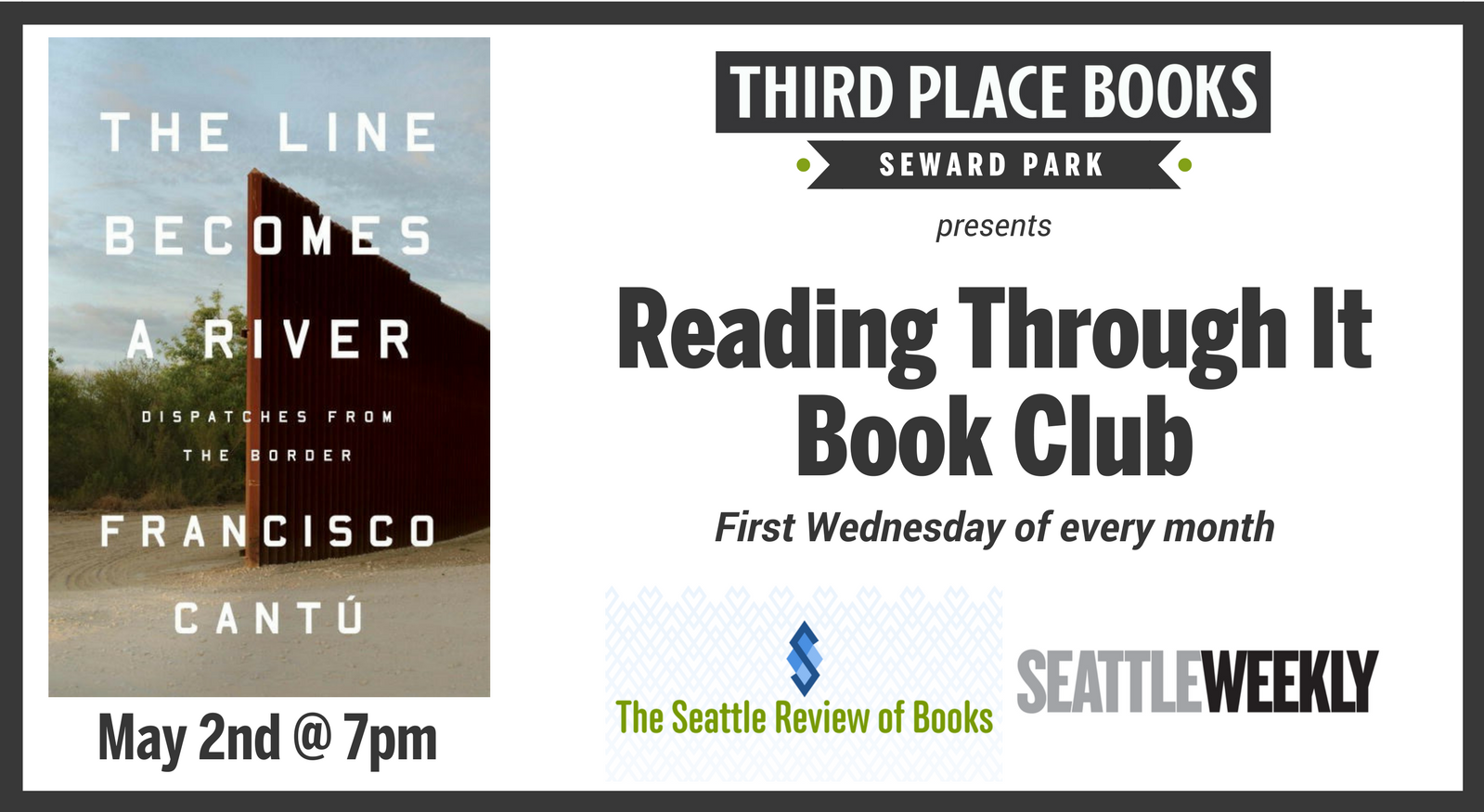
Tonight at Third Place Books Seward Park, we'll be joining the Seattle Weekly in a discussion of Francisco Cantú's excellent book about his experiences as a border guard, The Line Becomes a River. I've been waiting for over a year for our book club to talk about immigration, and Line brings some fascinating questions to the fore about the way we treat immigrants, about the way we train the Border Patrol, about what the American Dream really means.
It's a bonus, too, that Line is beautifully written. Cantú is a naturally gifted writer who capably illustrates the moral ambiguities of the situation. As Donna Miscolta writes in her fantastic review of the book on this very website:
The migrant who is deported. The snake that is gently nudged through a physical barrier that divides its natural territory. The juxtaposition is a theme that runs through the book: the harsh borderland desert that is habitat to animals and gauntlet to humans.
The book club is meeting tonight at 7 pm. No purchase is necessary; just bring an open mind.
Book News Roundup: Today in books on TV...
- This morning, the King County Library System announced that they would be producing a new monthly show titled King County Reads airing on King County TV. As the Kent Reporter writes:
“King County Reads” episodes will be taped at many of the 48 community libraries throughout the area. The program showcases topics related to reading, including author interviews, library programs, digital reading resources and book recommendations.
- Speaking of television, the HBO series adaptation of Seattle writer Matt Ruff's novel Lovecraft Country is moving closer to reality. Deadline reports:
Jonathan Majors (Hostiles) is set as the lead opposite Jurnee Smollett-Bell in HBO’s high-profile straight-to-series drama Lovecraft Country, from Oscar winner Jordan Peele and his Monkeypaw Productions, J.J. Abrams’ Bad Robot, Misha Green and Warner Bros Television.
The Seattle Public Library's Shelf Talk blog lists some of May's most celebrated literary holidays. Did you know that May has a whole day to honor the limerick? And that this month has a Hitchhiker's Guide to the Galaxy-themed holiday?
Amazon founder Jeff Bezos announced in an interview that he's so rich — as the world's first triple-digit billionaire — that he can only think of one thing to do with his money: "“The only way that I can see to deploy this much financial resource is by converting my Amazon winnings into space travel,” Bezos said in the interview. Ann Eleven at Electric Literature offers up some alternate ideas for Bezos to spend his cash on, including housing the homeless, funding libraries, and providing clean water to Flint, Michigan. Also, I offered up an alternate idea on Twitter:
Man, pay some goddamned taxes. https://t.co/CIpFTNE3Y6
— Paul Constant (@paulconstant) May 1, 2018
For Jeanine Walker, everything points back to poetry
"If you're ever introducing me at a party," our April Poet in Residence Jeanine Walker says, "introduce me as a poet." She ticks down the list of ways she's often described: "don't say I'm a musician, don't say I have a variety show, don't say I've written a novel. I'm a poet."
The risk of being described as a multihyphenate artist is real. Walker moved to Seattle a decade ago, and in the years since, she's insinuated herself into seemingly every aspect of our literary culture. Walker debuted on the local scene as the quick-witted host of the late, lamented Cheap Wine & Poetry and Cheap Beer & Prose reading series. She's the host and curator of the Mixed Bag variety show that until recently took place at the Royal Room in Columbia City and will likely relaunch at a new venue this fall. She's a musician, she's written a novel, and she's currently working on a novella-slash-album with her husband, Steve Mauer.
And Walker is an educator, too. She works with Seattle Arts and Lectures' amazing Writers in the Schools program, which teaches Seattle-area students to "discover and develop their authentic writing and performance voices."
She also coaches writers one-on-one, helping them develop their voice and shepherding them through the process of creating works of literature, from first draft through finished book. "I love coaching," she gushes. "I feel like that's my special gift. When I'm working with people, I think I'm able to read what someone is doing and notice what they might hope that their piece is going to do and then ask good questions to help them arrive at that conclusion." This isn't a one-way transaction: Walker greatly enjoys the deep dive into a person's work. One of her writers lives in New York and they regularly chat over Skype, Walker says, and "I've gotten to read his books, and it's a real privilege to get to know his characters."
But like Walker says: above all else, she's a poet. And she's not one of those stare-out-a-window-and-write-one-line-per-month kind of poets. No, Jeanine Walker writes. A lot. Every day. "I'm writing so many new poems that some of them won't ever be published," Walker says. Those unread poems are helpful, though, she says "because they helped me to get to the other ones," the ones that readers get to see.
One of the things I love most about Walker's poems is that they seem strongly built around a moment. Walker's poetry is immersive; she places you into a location and time with great economy, and then she wallops you with detail. Consider "Conversation," which begins "The rain pinched the glass/of the windowpane." You know the sounds that particular type of rain makes, you can feel the emotion that it brings to you. It's as vivid as an excellent haiku - in fewer syllables.
And in "At Night, Asleep," a gentle noise awakens the poet and her mind wanders. She thinks about her mother, about the need for our parents that never really dies. It's an atmospheric poem - a ghost story with a happy-ish ending - and the heart of the poem is a line that feels so specific that it's universal: "I mistook the sadness for beauty." Really, at one time in your life or another, haven't you mistaken sadness for beauty? Hasn't everyone?
Walker agrees with my assessment of her poems as largely built around very specific moments. "I am interested when I'm revising a poem that an image is as clear as it can be and that it's doing something." But she's not a narrative poet, exactly: "What's being made clear might not always make logical sense, or be linear, or even be clear."
This love of poetry came almost at the beginning. "I was writing stories when I was really little and I wrote my first poem in 7th grade," Walker says. In ninth grade, she found a mentor in a poetry teacher who encouraged her to write poetry for the rest of high school.
With Writers in the Schools, Walker is finding her own inspiration in the students. "The kids I'm working with now are second to fifth grade," she says. "I really see them as their own people, and their own poets." Walker says one of the girls in her class recently rhymed the word "enough-y" with "stuffy," and the delight of the pairing kept her going for days afterward.
All Walker's many talents and pastimes, ultimately, come back to the poetry. The performance, the coaching, the teaching, the prose all inform the poems. She's close to finishing a manuscript, and she's shopping individual poems around to different outlets. When I ask about her process, she shows me the wirebound notebook she's been filling with poetry. The handwriting starts legibly, but as the poems draw on, the writing becomes messier, more ecstatic as the poem pours out of her. Even without reading the poems, it's obvious that their writing was a biological imperative.
Walker affirms the urgency of the writing. "Without poetry," she says, smiling, "I would not be."
Here's a depressing paragraph:
The Swedish Academy is discussing whether to cancel the 2018 Nobel prize in literature, following a string of sexual assault allegations. A decision is expected on 3 May.
Men ruin everything.
Steady as she goes
Published May 01, 2018, at 11:59am
This Saturday at 6 pm, Ellen Forney signs her new book Rock Steady: Brilliant Advice from My Bipolar Life, at Fantagraphics Bookstore & Gallery. It's a book about finding stability and happiness when even your mind is working against you.
Present Tense: Seattle
A bell ringer hipsways by market stalls,
bellows hello to the man who brings the chanterelles,the immigrant families building bouquets of tulips
to launch like ships, the cheese makers and fishmongers,knife sharpeners and kombucha concocters.
She rings her instrument along each row signaling time
for the buying and selling to begin.Are you feeling lost? Did you think I shifted
scenes to a mercado in San Salvador or an Irish city street?Please! There’s no need for a Starbucks here!
At the Farmers Market, the tangerines reign supreme
along with local lettuce and trendy Tuscan melons.When the bell ringer passes the blueberry farmer with eyes
of indigo spangled in gold, she tells him if a fork falls,a stranger is coming to dinner and then walks on quickly
looking into the light snow of the cherry blossoms.
Her grandmother would have washed her mouth with soapfor even looking at a man — a light bulb turning on
in the old woman’s head: gangster, predator, no-goodnik.Don’t sweep after midnight she’d say — or you’ll miss
your good luck. She of the Lithuanian shtetl,
she who knew what it was like to have to obliteratethe scent of winter Daphne, the acres of daffodils.
Celebrate 20 years of Seattle Reads with Yaa Gyasi and SPL
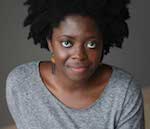
Seattle Reads is turning twenty, which is pretty stunning: that's two decades of bringing this city of diverse opinions together between two paper covers (maybe metaphorically, for the e-readers and book-listeners among you). We should probably bake them a cake, but wouldn't you know, they already planned a two-day celebration on May 16 and 17. And the whole city's invited!
The centerpiece is a set of readings and in-conversation events between Yaa Gyasi and (at separate venues) Lola E. Peters and Vivian Phillips, 2015-2017 chair of the Seattle Arts Commission. Other events feature photographs by Al Smith — his work is currently on display at MOHAI, but the Library has a few surprises up their sleeve — and a showcase of work from the African-American Writers Alliance. Get specifics on our sponsorship page, then mark your calendar (and pick up a copy of Homegoing at your local branch).
Sponsors like The Seattle Public Library ensure that every day, the Seattle Review of Books carries you the best in book news, book reviews, and all things bookish. We'd love to welcome you to our community of sponsors. Find out more about sponsoring or reserve one of the last dates in June and July here. (Looking for something later in the year? Let's talk.)
Your Week in Readings: The best literary events from April 30 - May 6
Monday, April 30: Rock Steady Reading
Ellen Forney is a living Seattle legend. Even if you don't know her work, you know her work - even if it's as "the person who drew those amazing gigantic white hands on red background at the Capitol Hill light rail stop." More likely, you know her from her comics in The Stranger from years ago, or her amazing memoir about life with bipolar disorder, Marbles, or any of her billion other amazing projects. Her latest book, Rock Steady, is an advice book for people with mood disorders. Tonight, she's in conversation with other living Seattle legend, David Schmader. Seattle Public Library, 1000 4th Ave., 386-4636, http://spl.org, 7 pm, free.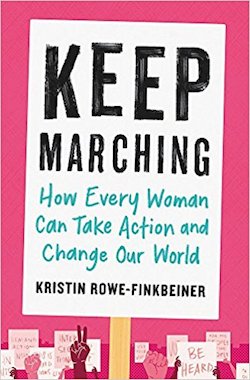
Tuesday, May 1: Keep Marching Reading
If you don't know Kristin Rowe-Finkbeiner, you really should. She's a co-founder of the amazing activist group MomsRising, which advocates for gun safety and public breastfeeding and just about every cause that matters. Tonight, she reads from her new guide for women in politics, Keep Marching: How Every Woman Can Take Action and Change Our World. She'll talk onstage with someone who also knows a lot about that: Congresswoman Pramila Jayapal Elliott Bay Book Company, 1521 10th Ave, 624-6600, http://elliottbaybook.com, 7 pm, free.Wednesday, May 2: Five Poets
Five authors from across the gender and poetic spectrums come together to read in Wallingford' holiest space. Readers include Olympia's Moss Hope Angel; "genderqueer glitch performer " RE Katz; Tacoma's Chloe Rose, whose "gender is Rilke's dark god;" and Boulder author Kolby Harvey. Open Books, 2414 N. 45th St, 633-0811, http://openpoetrybooks.com, 7 pm, free.Thursday, May 3: Night Hawks Reading
Friends, if you don't know who Charles Johnson is by now, I don't know what to tell you. Johnson was for years a stalwart fiction teacher at the University of Washington. In his retirement years, he has refocused his attention on Buddhism and writing. Now, he's publishing his first book of fiction in a very long time, a short story collection. Northwest African American Museum, 2300 S Massachusetts St, 518-6000. http://naamnw.org, 7 pm, free.Friday, May 4: Serpent in the Heather Reading
Wenatchee sci-fi author Kay Kenyon comes to Seattle with her latest book: a tale of assassination and spiritualist cults in 1936 Britain. Kenyon will be joined in conversation by Washington sci-fi author Liana Brooks.University Book Store, 4326 University Way N.E., 634-3400, http://www2.bookstore.washington.edu/, 7 pm, free.
Saturday, May 5: Free Comic Book Day
See our Event of the Week column for more details. https://freecomicbookday.com/Sunday, May 6: LeVar Burton Reads Live!
Sweet Jesus, are you going to pass up an opportunity like this? You don't want LeVar Burton to read to you? What the hell is wrong with you? Neptune Theatre, 1303 NE 45th St, https://www.facebook.com/events/188428798597299/, 8 pm, $30.Literary Event of the Week: Free Comic Book Day in Seattle
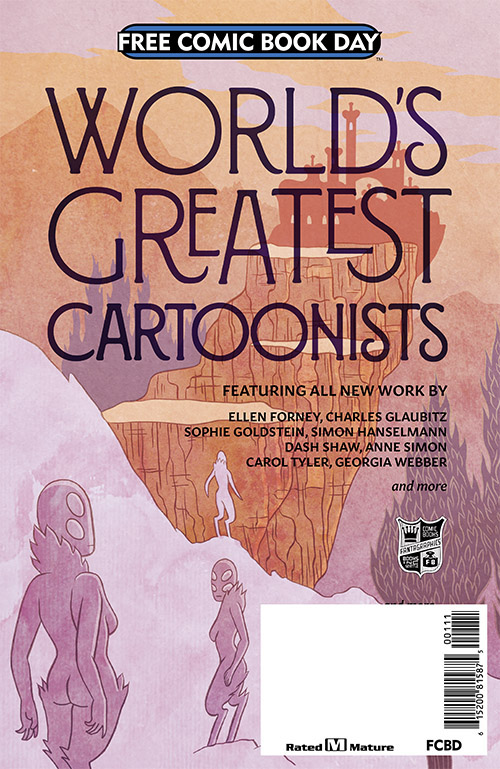
There are a lot of really fine events happening this week, but there's no question what the Literary Event of the Week is: This Saturday is Free Comic Book Day, the day when just about every comic shop in the region offers up free comics to anyone who walks in.
This year's FCBD is a bittersweet one: it's Seattle's very first Free Comic Book Day without long-running downtown store Zanadu Comics, which recently closed its doors. Zanadu fell prey to some very Seattle problems - rising rent - and some of the same problem that comics shops around the country are suffering from.
Comics aren't a niche medium anymore, but the industry still behaves like it's an embarrassing hobby: there's only one nationwide comics distributor, and the two big publishers aren't drawing in audience the way they used to. It remains to be seen if Marvel Comics can recover from a recent sales slump - funny how those movie audiences aren't walking into comics shops, isn't it? - and it remains to be seen if the growing graphic novel sections in independent bookshops will carve away too much business from comics-only shops.
But enough doom and gloom! Seattle still has a remarkable array of comics shops, and many of them are hosting special events for FCBD. Outsider Comics & Geek Boutique in Fremont is hosting a ton of local cartoonists all day long, including Colleen Frakes and Tatiana Gill. Arcane Comics in Shoreline is hosting cartoonists Lisa Pelayre and Marty Gordon, along with a bunch of fun all-ages activities from Parenting Geekly and a huge sale. The Fantagraphics Bookstore in Georgetown is hosting Seattle cartooning goddess Ellen Forney, who'll be signing her new book Rock Steady.
For more information about the closest store to you, visit https://freecomicbookday.com/. And while you should definitely pick up some free comics, if you're not currently strapped for cash or if you regularly attend comics shops, you should buy a book or two while you're visiting to subsidize all the books the shops are giving away to new customers. Comics have probably given you a lot of joy in your life; it only makes sense to pay some of that forward.
The Sunday Post for April 29, 2018
Each week, the Sunday Post highlights a few articles we enjoyed this week, good for consumption over a cup of coffee (or tea, if that's your pleasure). Settle in for a while; we saved you a seat. You can also look through the archives.
Whose Story (and Country) Is This?
Rebecca Solnit reframes America’s ideological churn as a battle over story — not who tells it, but for whose benefit it’s told. It’s a very Solnit-y clarifying lens on something insidious: our willingness to worry over the men held to account by the #MeToo movement, our willingness to cosset men whose views toward other humans are simply reprehensible, our immense discomfort with the discomfort of white men. At a far extreme, this is the narrative of the incels; to be prevented from taking their place at the center of the story is so violent to their egos that it justifies real and deadly violence to others.
The common denominator of so many of the strange and troubling cultural narratives coming our way is a set of assumptions about who matters, whose story it is, who deserves the pity and the treats and the presumptions of innocence, the kid gloves and the red carpet, and ultimately the kingdom, the power, and the glory. You already know who. It’s white people in general and white men in particular, and especially white Protestant men, some of whom are apparently dismayed to find out that there is going to be, as your mom might have put it, sharing.
It may seem like a forced tie-in, but it’s hard not to draw a connection on the day after Independent Bookstore Day: Cultivating independent bookstores and independent literature written by people who have other stories to tell might, perhaps, be a useful thing to do?
The Ben Duncan and Dick Chapman Papers Come Out
Ben Duncan was an American student on fellowship at Oxford University when he met Dick Chapman. Chapman was British, shared a love for literature, shared left-leaning politics. When Duncan and Chapman fell in love, their relationship was not just unacceptable but illegal. In 2005, five decades after they met, they became one of the first gay couples to register as civil partners in England.
One of the joys of bibliography is seeing how the making of books tells as much of a story as their contents. Duncan’s autobiography, The Same Language, charts changing public and political opinion in what subsequent editions reveal. Similarly, a collection of letters between the two men — donated to Columbia University Libraries in 1990 but closed to researchers until after both of their deaths — says much even in how it was stored. A blog post from the library tracks the progress of the collection, including how librarians helped Duncan and Chapman keep their secret until they were ready to tell it.
Calling the collection the Ben Duncan and Dick Chapman Papers might have been too obvious, but the addition of Duncan’s manuscripts allowed it to be presented as Duncan’s papers alone. Thus the collection’s original name: the Ben Duncan Papers. The collection’s original summary likewise hinted at the importance of the letters without giving anything away. The archivist wrote, “The correspondence consists chiefly of letters between Duncan and Richard Chapman, during 1956 and 1957, when Duncan, an American, was working in advertising in England, and Chapman, an Englishman, was working in advertising in New York. These letters provide a perspective on daily life during the mid-1950s, including such topics as books, plays, current events, and customs of that period.”
How the Trump Show Gets Old
We’ve had plenty of comparisons between the Trump presidency and his reality-television career, so kudos to Michael Kruse for finding an angle worth exploring: the similarity between the arc of Trump’s political career and the win-lose-win arc of his entertainment (and real estate) career. You may not feel like you need to know more about Donald Trump — likely you wish you knew less. Still, this is an interesting detailed look at how Trump handles failure, and especially how he manages to paint himself with success while the ship goes down beneath him. That he might do so again in 2020 is a possibility we can’t afford to ignore. Sadly.
The relentless decline of “The Apprentice” reflects a splash-and-crash cycle that’s been a hallmark throughout Trump’s life — from his buildings to his casinos to even his brief stint as a sports team owner. His initial successes are often followed by reckless decisions to double down on his bet, just to keep the excitement going — with often disastrous results. “It’s true of everything he goes into,” Trump biographer Tim O’Brien said in an interview. “He will hunker down and do something well — and then he thinks he’s Zeus.” And that’s when the trouble starts. “Because he’s not Zeus.”
Whatcha Reading, Kit Bakke?
Every week we ask an interesting figure what they're digging into. Have ideas who we should reach out to? Let it fly: info@seattlereviewofbooks.com. Want to read more? Check out the archives.
Kit Bakke is a Seattle-based writer, activist, and retired pediatric oncology nurse. Her third book, Protest On Trial: The Seattle 7 Conspiracy has just been released by the Washington State University Press. Kit appears tonight, Saturday April 28th, at the Elliott Bay Book Company at 7:00pm.

What are you reading now?
The Overstory by Richard Powers. Amazing and totally wonderful.
What did you read last?
Winter by Ali Smith, second of her seasonal trilogy. I like her writing a lot; pretty fearless about making readers do some of the work, but rewarding them at the same time.
What are you reading next?
Moby Dick by Herman Melville which, believe it or not, I've never read. Over the past 4-5 years I read War and Peace, and Don Quixote, both for the first time. Loved them both. I definitely advise waiting until you are an adult to read these wonderful books; I think you both enjoy and get a lot more out of them when you've been around the block a few times yourself.
The Help Desk: I ain't afraid of no ghost writers
Every Friday, Cienna Madrid offers solutions to life’s most vexing literary problems. Do you need a book recommendation to send your worst cousin on her birthday? Is it okay to read erotica on public transit? Cienna can help. Send your questions to advice@seattlereviewofbooks.com.
Dear Cienna,
I know this is an advice column, not a gossip column, so I’ll keep this very vague. I’ve recently heard some (very credentialed) rumors that a prominent writer — you’d know their name — no longer writes their own work anymore. Instead, they secretly employ a ghost writer.
What’s surprising to me is how shocked and betrayed I felt when I found out, though in retrospect it makes total sense: their writing has gotten more and more formulaic over the years.
Do I have any ethical responsibility to other readers of this person’s work? Many of them, after all, would likely share the same feelings of disappointment and betrayal that I felt. Should I alert the writer somehow that I’ve heard this gossip? Or should I just wait for the rumor mills to eventually do their work? If I’ve heard it, the news is probably everywhere already.
Anonymous
Dear Anonymous,
Would it shock and disappoint you to know that I occasionally cede control of this very column to a literate prepper named White Kevin so I can spend more time concentrating on my latest passion: becoming a Scott Pruitt impersonator?
I've had to beef up my sense of unearned entitlement and get some scalp work done – and convert my home from electricity to energy-efficient oil lamps and trash fires – but he and I both are naturally gifted with weak goblin chins and beady eyes that sink into our faces like twin pissholes in the sand, and the market for Scott Pruitt impersonators is pretty niche, so I feel like I have a real shot at fame. At the very least, I'll be popular at auto conventions, polar bear funerals, and whatever the opposite of Earth Day is.
I hope my confession won't alter your enjoyment of this column, which has always strived to offer sound advice from an untrustworthy source. Similarly, in this case I think you should take a deep breath and as Scott Pruitt would say, "don't let your opinions get derailed by the facts."
Regardless of who's actually behind the pen (or keyboard), you enjoyed this author's work, correct? There is nothing stopping you from continuing to enjoy it. Purists like yourself could argue that signing your name to someone else's work is unethical, but where do you draw that line? Put another way, where would Raymond Carver be without a brutally sparse editor?
And as much as I hate using the "F" word, the fact is the author is not plagiarizing – if they hire a ghostwriter, that individual is an employee who is being compensated for their work.
To employ another Pruittism, "it shouldn't matter how the oil is fracked, it's how you use it to cook the earth that counts."
Kisses,
Cienna
Portrait Gallery: Independent Bookstores
Each week, Christine Larsen creates a new portrait of an author for us. Have any favorites you’d love to see immortalized? Let us know
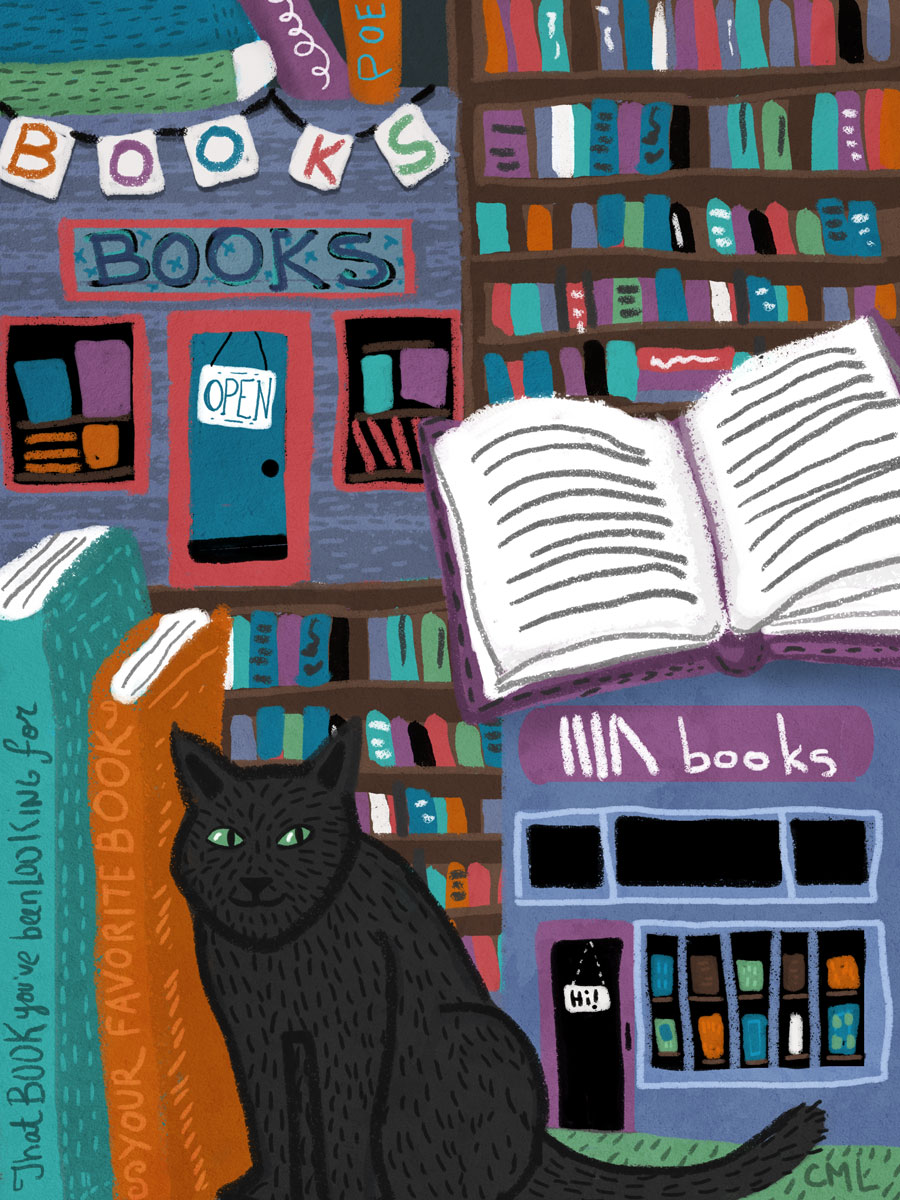
Saturday, April 28: Independent Bookstore Day
Independent Bookstore Day is a one-day national party that takes place at indie bookstores across the country on the last Saturday in April.
Learn more about our Event of the Week
See https://www.facebook.com/SEABookstoreDay/ for more information..
Criminal Fiction: So many crimes, so little time
Every month, Daneet Steffens uncovers the latest goings on in mystery, suspense, and crime fiction. See previous columns on the Criminal Fiction archive page
Reading around: new titles on the crime fiction scene
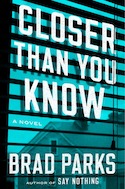
Melanie Barrick grew up partly in the foster care system, so when she arrives to pick up her son at childcare and is informed that he’s been removed by Social Services, she’s rightfully freaked out. Then, police find dealer-level drugs in her home. Barrick’s living nightmare in Brad Parks’ Closer Than You Know (Dutton) runs parallel to local law enforcement’s pursuit of a serial killer, so to mention that levels of tension run high in the novel feels almost like an understatement. A pretty-much perfectly-plotted page-turner, Parks’ latest gets part of its heart from a gentleman-lawyer as well as from Barrick’s focused determination to get her boy back.
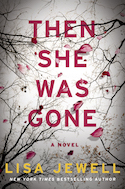
I’ve been a fan of Lisa Jewell’s writing since her 1999 debut, Ralph’s Party, and have enjoyed watching her successful shift from commercial and entertaining chick-lit — usually tinged with a cannily compelling element of intrigue — into fully-blown psychological suspense. Then She Was Gone (Atria), in which a bereaved, divorced mother, spontaneously dipping her toe in the dating pool, comes smack up against a look-alike of her missing daughter, is a terrific example of what Jewell does best: engaging characters and artful storytelling that places readers smoothly and swiftly into the middle of the action.
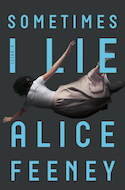
Alice Feeney’s debut, Sometimes I Lie (Flatiron), opens with a narrator who is speaking to readers from the depths of a coma. As visitors come in and out of her hospital room, she can hear what they’re saying, but can only direct her responses to us. Mere days ago, she was working on a successful radio show, feeling some trepidation about her husband’s feelings towards her; now her world is topsy-turvy in a completely unexpected way, and her bed-bound narration weaves around that of a long-ago diary as Feeney spins her creepy tale, one that’s both twisty and pretty damn twisted.
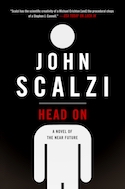
John Scalzi’s Head On (Tor), the eagerly-awaited sequel to 2014’s Lock In, sees the return of the dynamic duo of FBI agents Chris Shane and Leslie Vann. Set in an eerily possible near-future, with a large chunk of the world’s population hit by a virus that has left them with the locked-in Haden’s syndrome, Head On kicks off with death in a most spectacular fashion — think athlete, mid-game, on the field — and morphs into a snappy, cannily-driven police procedural in which Scalzi highlights and skewers contemporary issues and hypocrisies around a timely range of arenas, from healthcare, disability rights, bigotry, and racism, to the cynical exploitation and crushing of people by those with more power. Scalzi’s singular voice shines whether through his fiction, his blog or his Twitter feed, but I’m finding his elegantly-drawn, Haden-impacted world particularly captivating at the moment.
The Quintessential Interview: Alex Segura

Segura’s Pete Fernandez mysteries — recently optioned for television — are driven as much by the Miami-formed PI’s own hefty emotional baggage as by what the baddies of focus are up to. Blackout, Fernandez’ fourth misadventure after Silent City, Down the Darkest Street, and Dangerous Ends, is no different: the level of intensity is high, the level of sanity is low. Caught in a quagmire that includes a Scientology-like cult, a gunning-for-more politician, a long-dead high-school acquaintance of Fernandez and, yes, a soft-hearted but ambitious stripper, Segura’s latest offers a mind-spinning mix of dark and darker elements – not to mention multiple literal head-blowing moments, and, part-way through, a super-shocking surprise. But there’s more to Segura than meets the noir-ish eye: his other job encompasses writing and editing for Archie Comics, including the music-infused Archie Meets KISS and Archie Meets Ramones.
What or who are your top five writing inspirations?
- My family.
- Nonfiction books — history, true crime, biographies.
- Music.
- Miami.
- The news.
Top five places to write?
- At the dining room table.
- Coffee shop.
- In bed, scribbling in a notebook before the idea fizzles/I fall asleep.
- In my office.
- On the train, crafting an email to myself so I don't forget something. Frantic writing happens a lot.
Top five favorite authors?
- Raymond Chandler
- Elmore Leonard
- Jim Thompson
- Laura Lippman
- George Pelecanos
Top five tunes to write to?
I don't write to music — I try my best to achieve absolute quiet, which, look, doesn't exist when you have a toddler. But I do often think about music while writing. Here are the first five that pop into my head, as it's a constantly-morphing list.
- The Replacements, "Within Your Reach"
- Elvis Costello, "I Hope You're Happy Now"
- Miles Davis Quintet, "Four"
- Liz Phair, "Divorce Song"
- Johnny Cash, "Jackson"
Top five hometown spots?
- Versailles: Hands down, the best Cuban restaurant in Miami.
- Wynwood: Miami's evolving art district/neighborhood is a testament to how much the city's changed since I moved to NY. A reminder that I always have to stay focused on what the city is like now, as opposed to how I remember it. It's also just a cool stretch of restaurants and night spots...said the sleep-deprived dad of a toddler.
- Miami Book Fair: One of my favorite events of the year, and a must-do for booklovers.
- Marathon Key: The closest we can get to complete relaxation.
- Books & Books in Coral Gables: I've been hanging out at this bookstore since I was in college. A literary landmark in Miami if there ever was one.
Book News Roundup: Get Moss, Talk to Books, and guess how much e-book sales dropped by last year
The latest issue of Northwest-centric literary magazine Moss has been released, and you can read it for free! It features a poem by Nikkita Oliver and fiction by Heather Jacobs.
But if you have a little money kicking around, you should support the third print collection of Moss on Patreon, because they do excellent work and they pay their contributors.
You have likely already heard that Lindy West's memoir Shrill is being adapted into a comedy series at Hulu, and it will star the delightful Saturday Night Live star Aidy Bryant. Hopefully, the plot will center on Lindy's time working at an alternative weekly, because I've always thought an alt-weekly would be an interesting setting for a sitcom.
Spooky Girlfriend Press is raising funds to publish their second title, The Sexiest Man Alive. Sexiest is written by Seattle author Amber Nelson, who you might know best for the publishing company she ran for many years, alice blue. Nelson has fantastic taste in literature, and she's a great writer. So if you can, support the publication of the book. Think of it as a pre-order.
Wow: Sales of "traditionally published e-books" fell by 10 percent in 2017. I guess if you're waiting for e-books to make physical books obsolete, you're going to be waiting for a few more years.
Here's a silly waste of time that's kind of fun: Google has a search-engine-y kind of deal in which you can talk to books. It's called, fittingly, "Talk to Books." Here's their brief explanation for how it works:
In Talk to Books, when you type in a question or a statement, the model looks at every sentence in over 100,000 books to find the responses that would most likely come next in a conversation. The response sentence is shown in bold, along with some of the text that appeared next to the sentence for context.
- I asked Talk to Books some book-centric questions. Here are some answers:


- And for fun:

Thursday Comics Hangover: Telling the stories that young readers need to hear

First Second is quietly becoming one of the most consistently enjoyable comics publishers in the industry. The publisher doesn't get a ton of attention in the mainstream press — possibly because it focuses primarily on young adult comics — but readers have taken notice, and librarians have fallen in love with their books. I've recently spent time with two First Second releases, and they're entirely delightful — fun, heartfelt examples of comics as a storytelling art form.
Jen Wang's The Prince and the Dressmaker is a fairy tale romance with a modern twist: a poor young woman wants nothing more than to design and create beautiful gowns. She's plucked from obscurity by a prince to create the dresses of her dreams, but the catch is that they're for the prince himself to wear.
Wang's handling of the prince's need to dress as a woman is note-perfect. It's not a curiosity, or a perversity; it's just who he is. And while he encounters adversity when he heads out on the town as Lady Crystallia, it doesn't really spoil anything to say that Prince is a fairy tale romance with happy endings for all. This is a gentle, kind-hearted love story about being who you are and loving someone else for who they are.
The cartooning in Prince is all about faces: the faces of gossiping society girls at the ball, the pining face of the prince, the worried face of the dressmaker. All the pointing fingers and swooping dresses and bolts of luxurious fabric on every page points to the expressive faces of the characters. Wang is adept at drawing fashion that inspires delighted sighs from her readers, but the real secret to the liveliness in her art is in the mooning eyes and the cocked heads of her characters.
Portland cartoonist Vera Brosgol got her start at the stop-motion animation company Laika, and her brand new memoir-ish comic Be Prepared speaks to those animation roots. The book, about a young Vera getting shipped off to a Russian-language camp for the summer, doesn't contain any of the splashy action sequences of, say, Kubo and the Two Strings, but when Vera wanders through the woods, you can feel her location in space: Brosgol seems to know where every last tree in Camp Orra is located. It feels as real and as solid as the park closest to your house.
Young Vera is a bit of an outcast; she's too young to identify with her adolescent tentmates, and she's too smart to fall for the phony camraderie of awkward friendmaking games. So she gets lonely and she worries that she'll never fit in anywhere.
Be Prepared, thankfully, doesn't suddenly transform Vera into a social butterfly, and it doesn't promise that every childhood hurt will magically heal. But it does promise that if you hang on long enough, things will get better — and that's just the message that kids need to hear.
While the big two comics publishers struggle to appeal to young adult readers with big-eyed cutesy versions of the same old superheroes, First Second is speaking to young readers on their own terms, and telling new twists on classic stories. Forget Archie comics — First Second's are the comics that will inspire future generations of cartoonists to pick up their pens and start doodling.
